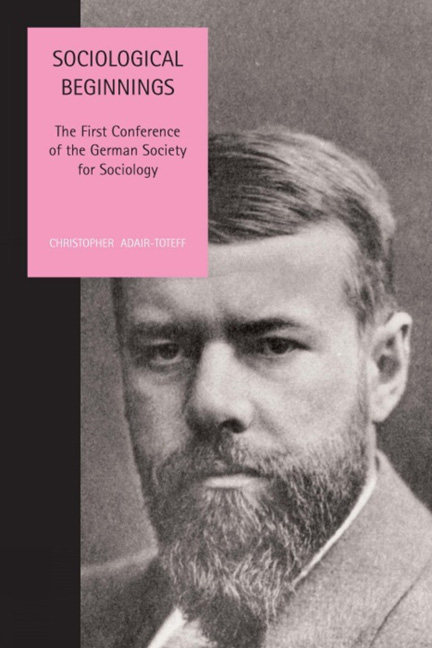Book contents
- Frontmatter
- Dedication
- Contents
- Preface
- A Note on Translation
- Chronology
- Short Biographies of the Main Participants
- Introduction
- The Papers of the First DGS Conference
- Georg Simmel – Sociology of Society
- Ferdinand Tönnies – Ways and Goals of Sociology
- Max Weber – Business Report followed by The Comparative Sociology of Newspapers and Associations
- Werner Sombart – Technology and Culture
- Ernst Troeltsch – Stoic–Christian Natural Law and Modern Profane Natural Law
- Select Bibliography
- Index
Ernst Troeltsch – Stoic–Christian Natural Law and Modern Profane Natural Law
from The Papers of the First DGS Conference
- Frontmatter
- Dedication
- Contents
- Preface
- A Note on Translation
- Chronology
- Short Biographies of the Main Participants
- Introduction
- The Papers of the First DGS Conference
- Georg Simmel – Sociology of Society
- Ferdinand Tönnies – Ways and Goals of Sociology
- Max Weber – Business Report followed by The Comparative Sociology of Newspapers and Associations
- Werner Sombart – Technology and Culture
- Ernst Troeltsch – Stoic–Christian Natural Law and Modern Profane Natural Law
- Select Bibliography
- Index
Summary
[Friday Afternoon, October 21 1910
Opening Address by the chairman, Professor Simmel
Ladies and gentleman, I open this session and announce that, counting on your friendly agreement, the Executive Board has resolved that in our scientific assembly we will refrain for the foreseeable future from expressions of applause. Indeed, we are a very new Society and we are still fortunate in not having any ruinous castles or other landmarks in our past, so that we can make our own traditions instead of having to follow traditions from the past. Thus, we want to establish this tradition, since it also adheres to the principle of our Society that we should refrain from making value judgements. So, where possible, we want to lead by good example. Now I give the floor to Professor Troeltsch – Heidelberg.]
It is not easy to agree about the task and the essence of sociology, but knowing how to ask questions in sociology and how to observe are obviously important, especially in view of the pressing need for historical research. Learning the right approach makes it possible to envisage the subject being investigated in different ways.
The following arguments are not intended to be instrumental in solving the great problems of sociology. They are intended merely to demonstrate the enlightening effects that questions formulated along sociological principles can have on a particular historical subject. In relation to the generally large themes of this Conference, this paper is only a very modest contribution, but it can show how it is possible to draw something useful from a still very incomplete science.
From the beginning, sociological investigation must make a fundamental distinction between sociological natural laws and the laws that might ideally be made by those who have power over ideas. To the first domain belongs knowledge, as in the circumstances of the extent of a sociological circle to the manner of the bonds of its members. The smallness of the circle corresponds to the personal and inward–looking immediacy of the ties, together with the danger of personal quarrels and separations. The largeness of the circle corresponds to the abstract and impersonal nature of the relationships, allied to the powerful and formal nature of the ties, together with the danger of the uniformity and powerlessness of the members.
- Type
- Chapter
- Information
- Sociological BeginningsThe First Conference of the German Society for Sociology, pp. 110 - 131Publisher: Liverpool University PressPrint publication year: 2005



